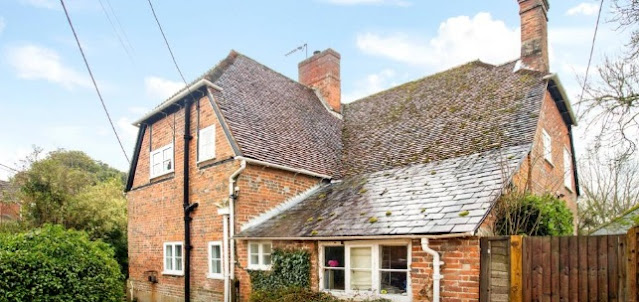Cottonworth Farmhouse: Home of My Ninth Great Grandfather John Osgood and Family
John Osgood: 1595-1651 (9th Great-Grandfather,
maternal side)
Mary Osgood Ingalls: 1633-1686 (8th
Great-Grandmother, maternal side)
Serendipity led me to discover the 400-plus-year-old
property where my ninth great-grandfather once lived. It all started when I
received a notice from FamilySearch that someone had posted a story about one
of my 8th Great-Grandfathers. To my surprise, this man, John Stevens,
was someone I did not yet have in my Ancestry tree. This sent me back to Ancestry to search
records from 1630s Massachusetts. While filling out this new branch of my
family tree, I discovered a new ninth-great-grandfather, John Osgood.
So how did I get from John Stevens to John Osgood? I had started
building John Stevens’ family tree. He had several children, including a son
named Joseph, who was my 7th great-grandfather. Joseph married a
woman named Mary Ingalls, the daughter of Henry Ingalls and his wife Mary
Osgood. That led me to Mary Osgood’s parents, John Osgood and Sarah Ann Booth
Osgood.
John Osgood immigrated to Massachusetts in 1638. He helped
to found the town of Andover, naming the town after the area in England where
he was born, raised and was married. To my surprise, other researchers working
on this family had traced John not just back to England, but to the actual
house where he was living when he decided to emigrate. This house is called
Cottonworth Farmhouse and still exists in Wherwell, Hampshire.
Of course, I had to Google the house. To my delight, I
discovered that it had recently been listed for sale, and had a series of
photos of the interior and exterior attached to the listing. What a find!
 |
| Street view of Cottonworth Farmhouse |
The real estate listing describes Cottonworth Farmhouse as
follows:
“A traditional Grade II Listed farmhouse situated in this
small hamlet in the Test Valley. Having been owned by the same family for
several generations the property offers much charm and character with exposed
beams and open fireplaces. The accommodation is generous at just over 2500 sq
ft and well suited to family life.”
The house’s address is SU 33 NE Wherwell Fullerton Road. The sellers were asking a price of one
million pounds, which equals $1,165,000 US currency.
 |
| Living room with beamed ceiling |
Grade II Listing is similar to a listing on the National Historic
Register here in America; the house has historic value or possible
architectural significance, so any alterations or additions must meet with
government approval. The Historic England website describes the house as
follows:
“House. C17 timber-framed house, with C18 brick cladding,
and a ½-hipped tile roof. T-shaped structure of 1 storey and attic, 3 windows
to the south front. The walls are of English bond, with cambered openings,
plinth. Casements, 1 gabled dormer with sill at eaves level. Boarded porch. A
later outshot on the north-west side has a slate roof.”
 |
| Master Bedroom |
While I still have a lot of records to locate to more fully
flesh out the life of John Osgood, I am fairly confident that he is my
ancestor. Other researchers have done a good job tracking down records that
seem to match him and his family. Even sources in the Wherwell area of
Hampshire have accepted the research. Here is a passage from the Wherwell &
Chilbolton History Group’s website (Wherwellhistory.com), recounting a recent
visit by a group of American Osgood descendants:
“Andover Massachusetts
became twinned with Andover [Hampshire] in 2000 but the link between the towns
is more than 350 years old. In the 1630s, the Osgoods farmed Cottonworth Farm
near Wherwell. During the first years of that decade the family faced problems
of religious intolerance, increasing taxes, crop failure and finally, in 1638,
a disastrous flood across their land. A relative, Christopher Osgood from
Marlborough, had crossed the Atlantic in 1633 to begin a new life in the
American colonies. In 1638, John Osgood and his family followed, eventually
making his home in a settlement called Cochichowicke (Great Water), which was
later renamed Andover, Mass. John eventually owned over 600 acres of land and
became one of its most respected and influential citizens.”
The website post also described the Cottonworth property.
“The original
Cottonworth Farmhouse is still standing (and occupied) at the turning to Wherwell
from the Stockbridge Road at Cottonworth. Several of the American guests are
members of the North Andover Historical Society and were delighted to have the
opportunity to see the English home of one of the founders of their town. It
gave them a better understanding of the area he left to establish himself in
Andover MA.”

The back section of the house shows the one-story addition with the slate roof. Presumably the rest of the house originally had a thatch roof.
I look forward to continuing my research into this
interesting family, and perhaps someday I can travel to Wherwell to see Cottonworth
Farmhouse for myself!
Sources:
https://www.osgoodancestry.org/emigrants.html
https://historicengland.org.uk/listing/the-list/list-entry/1093381?section=official-list-entry
https://www.rightmove.co.uk/properties/120824606#/?channel=RES_BUY
https://archive.org/details/genealogyofdesce00osgo/page/n23/mode/2up

No comments:
Post a Comment